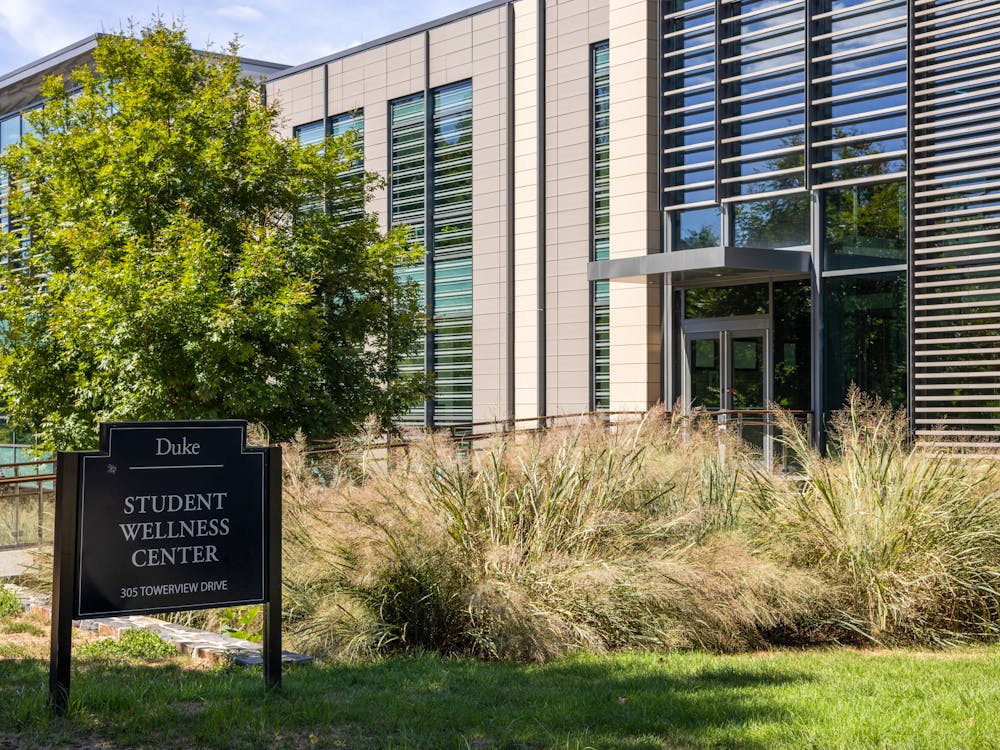As the fabled first-year flu makes its yearly rounds on campus, many students turn to Student Health for medical care. While primarily marketed as a clinic, Student Health offers a wide range of services that students can take advantage of.
Located on the second floor of the Student Wellness Center on West Campus, Student Health’s main office acts as the first point of contact for any general health concerns.
The facility is open from 8 a.m. to 4:30 p.m. on Mondays, Tuesdays, Wednesdays and Fridays, and from 9 a.m. to 4:30 p.m. on Thursdays. The office is not open on the weekend and closes from 12 to 12:30 p.m. on weekdays for lunch.
Students can make appointments for future visits through the Duke My Health portal or can schedule same-day visits via phone call at (919) 681-9355.
In addition to sick visits, primary care services offered include treatment for skin concerns, sports injuries, sexual health concerns, annual preventative health exams and chronic illness management.
Student Health performs several lab tests covered by the Student Health Fee, such as chemical urinalysis, rapid strep, rapid mononucleosis and rapid HCG. The office also offers a number of sexual health services, including birth control, pap smears, pregnancy testing and Sexually Transmitted Infection testing, among others.
On the third floor of the Wellness Center, Student Health offers physical therapy for students who are experiencing acute or chronic injuries and recovering from orthopedic surgical procedures. Services include pain management, balance training, injury prevention and therapeutic exercises, among others.
Students seeking mental health care can visit Duke Counseling and Psychological Services, which is located on the third floor of the Wellness Center and is open from 8 a.m. to 5 p.m. Monday through Friday.
Additionally, Student Health offers in-person and virtual nutritionist consultations, which are covered by the Student Health fee. Students can make an initial 45-minute appointment by emailing nutrition-appointments@duke.edu.
Student Health also has an international travel clinic that provides pre-travel appointments for students studying abroad, offering vaccinations, lab tests and physical exams that different programs may require.
“Many students don't know that Student Health offers travel consults, or even that they should have a consultation before traveling internationally,” wrote John Vaughn, director of student health services and associate professor of family medicine and community health, in a Sept. 5 email to The Chronicle. “Students can come to see us, and we can provide information about how to stay healthy and safe wherever they are traveling as well as all necessary medications and immunizations.“
Prior to their visit, students must complete a questionnaire and schedule an appointment eight to 12 weeks prior to departure. In addition, they should bring their insurance cards, vaccination records, international yellow card and any recommendations provided by their program.
Vaccinations related to international trips are not covered by the Student Medical Insurance Plan.
Additionally, students can have their prescriptions filled at the Duke Campus Center Pharmacy, which is located on the first floor of the Wellness Center.
The Duke Student Health Allergy Clinic provides allergy injection services by appointment to students who have received allergen immunotherapy from their primary allergist covered by the Student Health Fee.
Many students have expressed concerns over health care costs, which may hinder students from utilizing the office.
Students are required to be covered by medical insurance during the academic year.
All students are automatically enrolled in Duke’s Student Medical Insurance Plan (SMIP), unless they submit a waiver to maintain coverage through a plan that meets the University’s standards for “adequate coverage.” Enrollment in the SMIP is mandatory for international students holding an F1 or J1 visa.
“The most important, and one of the most confusing, things about insurance coverage that students should know is that something being ‘covered’ does not mean that there will not be any out-of-pocket costs,” Vaughn wrote.
He explained that while all visits to Student Health are covered by the Student Health Fee, some services performed by outside specialists — like x-rays or certain laboratory tests — require a copay. The student health plan also does not cover services that are not considered “medically necessary.”
Get The Chronicle straight to your inbox
Sign up for our weekly newsletter. Cancel at any time.
“The medical necessity of services is determined by the clinical evaluation performed by our health care providers,” Vaughn wrote. “This necessity is communicated by the diagnosis codes that are used when ordering tests and referrals.”
Vaughn noted that Student Health employees can help students determine out-of-pocket costs before having services performed and that “providers are always happy to work with [students] to figure out the best plan based on their health and financial situation.”
Vikram Sambasivan is a Trinity first-year and an associate news editor for the news department.

